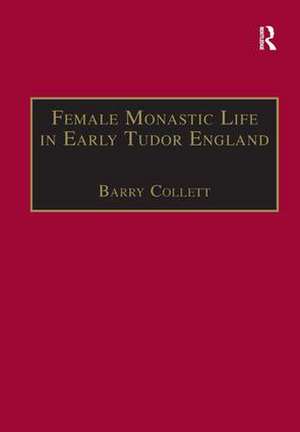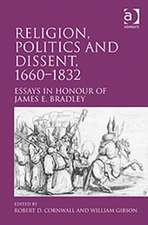Female Monastic Life in Early Tudor England: With an Edition of Richard Fox's Translation of the Benedictine Rule for Women, 1517: The Early Modern Englishwoman, 1500-1750: Contemporary Editions
Editat de Barry Colletten Limba Engleză Hardback – 25 mar 2002
Din seria The Early Modern Englishwoman, 1500-1750: Contemporary Editions
- 18%
 Preț: 1057.89 lei
Preț: 1057.89 lei - 26%
 Preț: 764.20 lei
Preț: 764.20 lei - 12%
 Preț: 338.90 lei
Preț: 338.90 lei - 26%
 Preț: 820.32 lei
Preț: 820.32 lei - 17%
 Preț: 190.88 lei
Preț: 190.88 lei - 26%
 Preț: 818.67 lei
Preț: 818.67 lei - 28%
 Preț: 820.47 lei
Preț: 820.47 lei - 16%
 Preț: 262.14 lei
Preț: 262.14 lei -
 Preț: 449.41 lei
Preț: 449.41 lei - 16%
 Preț: 260.54 lei
Preț: 260.54 lei -
 Preț: 449.41 lei
Preț: 449.41 lei -
 Preț: 389.38 lei
Preț: 389.38 lei - 12%
 Preț: 343.09 lei
Preț: 343.09 lei - 17%
 Preț: 259.98 lei
Preț: 259.98 lei -
 Preț: 389.66 lei
Preț: 389.66 lei -
 Preț: 382.54 lei
Preț: 382.54 lei
Preț: 762.97 lei
Preț vechi: 1026.69 lei
-26% Nou
Puncte Express: 1144
Preț estimativ în valută:
145.100€ • 152.74$ • 121.28£
145.100€ • 152.74$ • 121.28£
Carte tipărită la comandă
Livrare economică 02-16 aprilie
Preluare comenzi: 021 569.72.76
Specificații
ISBN-13: 9781840146097
ISBN-10: 1840146095
Pagini: 192
Dimensiuni: 153 x 219 mm
Greutate: 0.39 kg
Ediția:1
Editura: Taylor & Francis
Colecția Routledge
Seria The Early Modern Englishwoman, 1500-1750: Contemporary Editions
Locul publicării:Oxford, United Kingdom
ISBN-10: 1840146095
Pagini: 192
Dimensiuni: 153 x 219 mm
Greutate: 0.39 kg
Ediția:1
Editura: Taylor & Francis
Colecția Routledge
Seria The Early Modern Englishwoman, 1500-1750: Contemporary Editions
Locul publicării:Oxford, United Kingdom
Cuprins
Contents: English society and Here begynneth: the question of good govermamce in 1516; The monastic life and Here begynneth: the ambivalence of the monastic vocation; Making the translation during autumn and winter of 1516: Here begynneth and the early modern Englishwoman; Three Epilogues: Fox, the nuns, and the book; editorial notes: Here begynneth the rule of seynt Benet: Richard Fox's translation of the Benedictine rule for Women, 1517; Bibliography; Index.
Recenzii
'The introductory essay provides a vivid account of some of the last abbesses and prioresses drawn mainly from episcopal and archiepiscopal visitation records.' Journal of Ecclesiastical History 'Collett's affection for Fox and his translation make this book a valuable contribution to the study of early modern English nuns.' The Catholic Historical Review
Descriere
This gendered translation of the Benedictine Rule for nuns in 1517 is also a handbook for women on exercising authority, management skills and the art of good governance, including monastic property and relations with the outside world. Barry Collett here provides a modern facsimile edition of Fox's translation, written in the tumbling phrases of passionate prose that make Fox stand out as a literary figure of the English Renaissance. Collett also provides an extensive introduction that argues that Fox's experience as an administrator and senior political adviser with special responsibility for foreign affairs, mainly with Scotland and France, the political situation in 1516, and social concerns Fox shared with Thomas More, all provide keys to understanding this translation of the rule.













